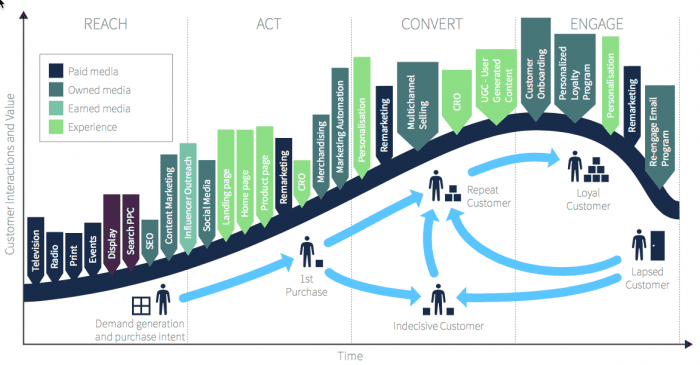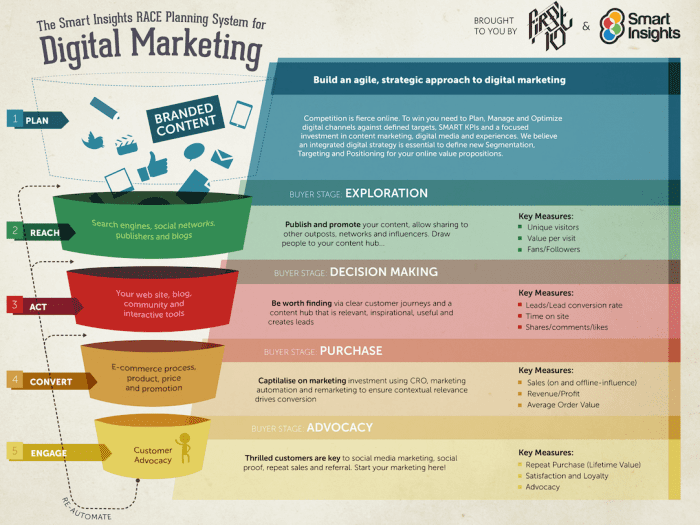How to plan your product launch using the RACE planning framework
You are working during one of the most entrepreneurial eras in history. Thanks to digital media, launching a product to a global audience has never been so manageable. Equally, competition has never been as fierce.
Our product launch campaign playbook will guide you through the process of how to successfully launch your product online.
It considers how to avoid common pitfalls encountered when launching a product and how to promote your online launch. These pitfalls commonly involve missed opportunities to reach or persuade your audience through the customer lifecycle. This visual shows all the potential interactions that can be used during a product launch across the touchpoints of the customer lifecycle. Use it as a visual checklist of what’s required.
The reason we created our launch plan guide is simple, it’s a common ‘use-case’ in marketing. All businesses create new products or new propositions to increase revenue and appeal to different audiences. It’s particularly relevant for startups when they first launch.
Planning helps you explore potential opportunities for your launch, define aims and prepare your launch timeline.
Creating a campaign plan empowers you to prioritize resources in a logical and effective order. With a product launch, as with so many issues related to business, whilst you can plan for most eventualities, you should also plan for the unexpected.
How to structure your campaign plan
You may know the Smart Insights RACE Planning framework which covers five parts which are essential outcomes of a marketing or digital marketing plan, they’re Plan – Reach – InterAct – Convert and Engage an audience. For this Playbook, the framework is broken down into 25 more detailed activities for you to review in a checklist format. For each of these 25 activities there we recommend specific actions to take and resources and tools giving more details.
The five parts of RACE planning will help you:
- Plan your launch
- Reach your market
- Act through encouraging participation
- Convert by turning casual surfers into customers
- Engage by turning casual customers into loyal advocates
Plan for the worst
With so many variables, it would be foolish to suggest you can always be fully prepared for anything. However, by reviewing the risks and defining steps to mitigate them you will be able to remain in control of each stage of your launch, even if the unexpected happens, you’ll be ready to respond to it coolly, rather than react on the spur-of-the-moment.
Your vision and how to reach it
Depending on your intended market, you will need to develop a clear all-encompassing vision. Each aspect of your product launch vision is supported by a substantiating statement.
Example – consumer
To become the bestselling maze-building gaming app.
Every maze is based on highly accurate maps of some of the world’s most popular actual mazes.
Example – B2B
To become the most trusted online small business accounts software platform you can buy.
Our software package has been developed in partnership with each of USA’s top three small business accountancy practices.
Having crafted these statements, it's time to consider ‘how to get there’ strategies:
Example – consumer
To become the bestselling maze building gaming app.
Every maze is based on highly accurate architectural drawings of some of the world’s most popular mazes.
PLANNING:
- Develop brand awareness.
- Design a social media strategy.
- Create a viral marketing campaign.
- Agree budgets, targeting appropriate audience, testing and metrics.
Example – B2B
To become the most trusted small business accounts software platform.
Our software package has been developed in partnership with each of USA’s top three small business accountancy practices.
PLANNING:
- Build a personalized email strategy.
- Implement online PR campaign.
- Create online small business advice platform.
Agree budgets, targeting appropriate audiences, testing and metrics.
What is it? Who are you? Where are they?
You are intimately familiar with every aspect of your new product. However, the same cannot be said for your prospective markets and audience. Initially the most important of these markets are ‘early adopters’, particularly where you are launching into a relatively new product category.
During the first phase of your planning, beyond simply considering what your product is, think about how and where it fits on the ‘radar’ of your early adopter marketplace. This is crucial. Not only does it help ensure the features and benefits of your product are understood, but importantly, it sends out a signal that helps early adopters distinguish your offering against competitors who may produce a similar product.
From the outset, your phased campaigns need to incorporate distinctive messages which help early adopters justify making a purchase - whilst at the same time empowering them to tell others just how brilliant your product is, and why they are proud to boast being amongst the first to own it.
Creating a campaign timeline
Draw up a timeline covering the build-up, launch, and post-launch, mapping each stage against benefit messages aimed at specific markets, along with benchmarks against which you can explain any value propositions against competitors. Keep in mind that your online (consumers) first concern will always be whether your marketing helps them make informed decisions and choices.
When developing your timeline, consider how you can work with potential influencers early on. Online, this has far-reaching implications that extend to how and where you promote your product. For example, which influencer blogs should you have in your sights? How about podcasts and trusted journalist reviews…
Using tracking KPIs to review audience engagement
It will help to define launch performance indicators for an agile launch. When launching a new product, as with any campaign, you will want to define success criteria, but it’s particularly important for a new product launch since uncertainty means you will need to adjust your approach
Key performance indicators include:
- Video downloads.
- Infographic downloads.
- Brochure downloads.
- Click Through Rates
- Volume-based KPIs
- Total revenue from customers acquired through online marketing.
- Cost Per Lead.
- Customer value.
(Calculated by the average sale per customer x the average number of times a customer buys per year x the average retention time in months or years for a typical customer.
Building the option to update or upgrade a product over time can enhance your income revenue stream).
- Mobile leads, traffic, and conversion rates.
- Social media traffic and conversion rates.
- Organic traffic.
- Landing page conversion rates.
source http://www.smartinsights.com/traffic-building-strategy/campaign-planning/structure-product-launch-campaign/


No comments:
Post a Comment